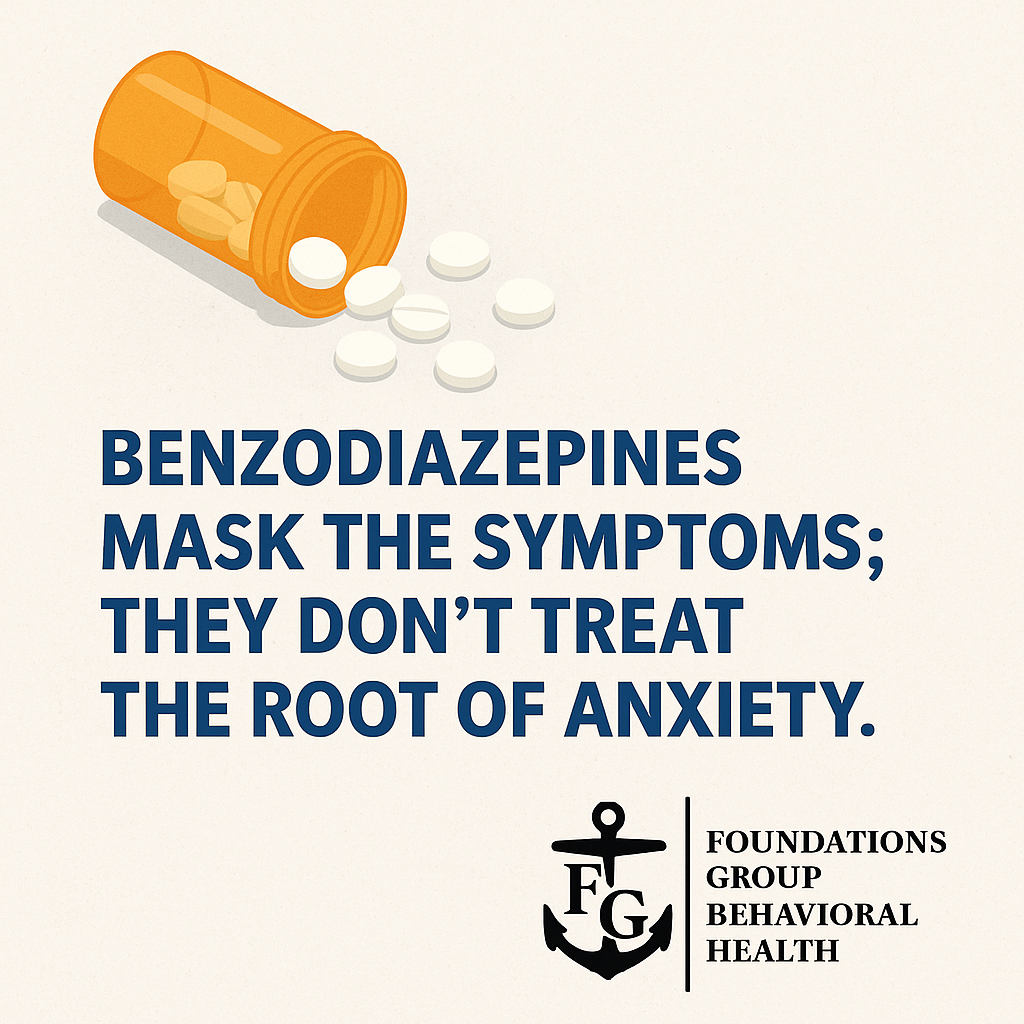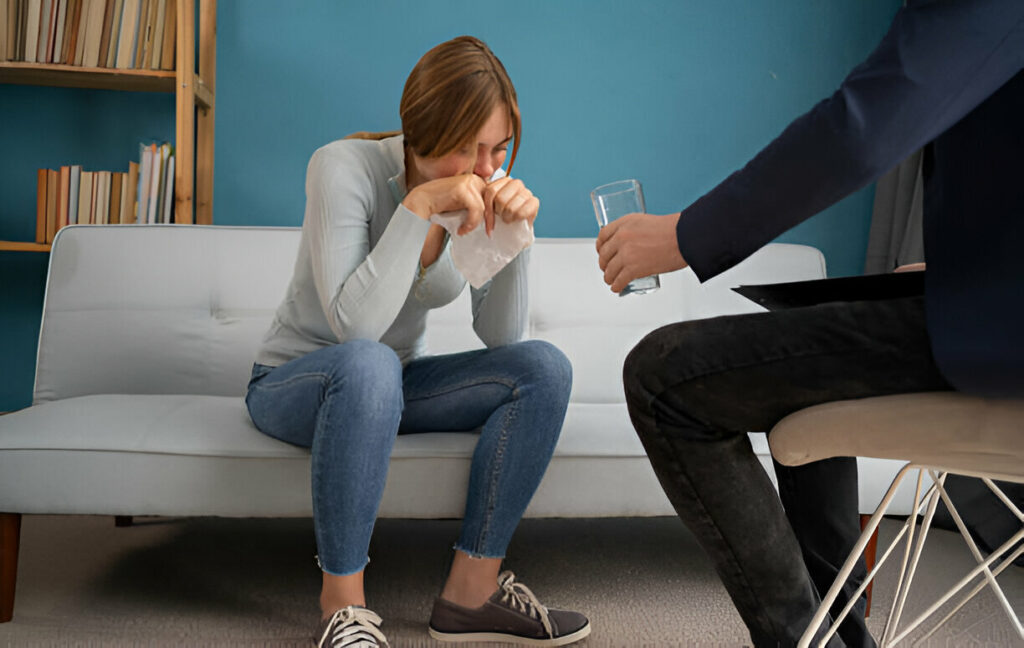When the Pill That Calms You Starts to Control You
You knew what anxiety felt like before the medication. It was racing thoughts, shallow breathing, the edge of panic lurking beneath the surface. When a doctor finally gave it a name—Generalized Anxiety Disorder, Panic Disorder, or something close—it felt like validation. And when they offered a benzodiazepine, it felt like relief.
But now, somewhere along the line, that relief has started to feel more like dependence.
If you’re beginning to worry that the thing helping you cope is also hurting you, you’re not alone—and you’re not broken. At Foundations Group Behavioral Health in Cape Cod, MA we help people safely untangle this overlap between anxiety and addiction every day. It’s called dual diagnosis, and it’s more common—and more treatable—than you might think.
When the Calm Turns to Craving
Benzodiazepines (like Xanax, Ativan, Klonopin, or Valium) are prescribed to manage acute anxiety. They work fast. They slow down the nervous system, bring down your heart rate, quiet your thoughts. For many people, especially those in crisis, they offer real and needed relief.
But here’s the catch: they’re not designed for long-term use.
Over time, your brain can build a tolerance. What once felt like enough no longer does. You might notice withdrawal symptoms between doses—irritability, rebound anxiety, even insomnia. You might start to panic without the medication you once took to prevent panic. And that’s when the solution becomes the problem.
Anxiety Doesn’t Disappear—It Hides Behind the Pill
It’s easy to mistake medication for healing. But benzodiazepines don’t treat the root of anxiety—they mask it. And when the medication is suddenly gone (whether due to a missed dose, a lost prescription, or an attempt to quit), the underlying anxiety can come back even stronger.
This is why benzodiazepine dependence can be so terrifying: you’re not only facing withdrawal, but also the raw, unmedicated version of the anxiety that brought you here in the first place.
Real healing doesn’t come from numbing. It comes from understanding.
What Is Dual Diagnosis Treatment—and Why Does It Matter?
Dual diagnosis treatment is designed for exactly this kind of complexity. It addresses both a mental health disorder (like anxiety) and a substance use disorder (like benzo dependence) at the same time.
Why is that important? Because you can’t truly treat one without addressing the other.
At Foundations Group Behavioral Health, our dual diagnosis program includes:
- Medical support for safe benzo tapering or detox, when needed
- Therapy to explore the root causes of anxiety, not just the symptoms
- Coping skills that replace medication with sustainable tools
- Peer support from others who know this path personally
Learn more about our co-occurring disorder treatment program.
You Are Not a Failure for Needing Help
Many people with anxiety feel a deep need to “hold it together.” You may have hidden your medication use, minimized your symptoms, or felt ashamed for losing control of something that was once helping.
But medication dependence is not a moral failure. It’s a neurological and emotional response to a powerful drug—and it happens more often than most people realize.
You are not weak for needing support. You are wise for reaching for it.

Healing Means Slowing Down—and Starting Over Differently
Coming off benzos doesn’t mean facing anxiety alone. In fact, the safest way out is with clinical and emotional support. That’s what dual diagnosis treatment is built for. It helps you pause, reassess, and gently begin to heal both the symptom and the cycle.
With time, your brain can re-learn how to regulate stress. Your body can regain balance. You can rediscover calm that comes from within, not from a pill bottle.
And no, you don’t have to rush it. Healing isn’t linear—but it is possible.
There’s a Way Forward, and You Don’t Have to Walk It Alone
If you’re reading this and feeling both scared and hopeful—that’s okay. Hope doesn’t need certainty to begin. It just needs a crack in the door.
Dual diagnosis treatment exists because people like you deserve more than symptom management. You deserve healing that lasts.
Ready to take the next step?
Call 888-685-9730 or visit our Dual Diagnosis Treatment Program in Cape Cod, MA to explore a recovery plan that treats you—not just your symptoms.
FAQ: Benzodiazepine Dependence and Anxiety Treatment
Q: How do I know if I’m addicted to benzodiazepines or just dependent?
A: Dependence means your body is used to the medication and may experience withdrawal without it. Addiction usually includes psychological cravings, using more than prescribed, or feeling unable to stop even if it’s hurting you. A clinical assessment can help clarify what’s going on.
Q: Can I safely stop benzos on my own?
A: It’s strongly recommended that you do not stop benzodiazepines cold turkey. Withdrawal can be dangerous, especially if you’ve been taking them long-term. A medically supervised taper is the safest route.
Q: What kind of therapy helps with anxiety without medication?
A: Cognitive Behavioral Therapy (CBT), mindfulness-based therapies, and exposure therapy are all evidence-based approaches that address anxiety at its root. These are often part of a dual diagnosis treatment plan.
Q: What’s the difference between dual diagnosis and regular addiction treatment?
A: Regular addiction treatment may focus solely on substance use. Dual diagnosis treatment recognizes that mental health disorders often underlie addiction and provides integrated care for both.
Q: Is this treatable even if I’ve been using benzodiazepines for years?
A: Yes. With the right support, many people recover after long-term use. Healing may take time, but it is absolutely possible—especially with a team that understands both the physical and emotional layers.








